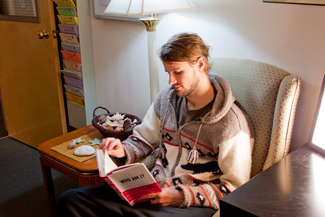In light of two student deaths less than two weeks ago, it is important to remember the support the University of Idaho and the community provide to each other — how in difficult times they come together and help one another, said Sharon Fritz, psychologist at the Counseling and Testing Center.

Photo Illustration by Amy Asanuma | Argonaut
Senior Kevin Baker uses a sun lamp in the Counseling and Testing Center in Mary E. Forney Hall. The CTC offers services including crisis intervention, individual and group counseling and more.
“As I watch our university and community respond to tragedy, we do come together and support one another,” Fritz said. “The CTC takes a really active role, not only in helping students individually, but also to help our community. To me, that’s exactly what a counseling center is supposed to do.”
Fritz said it is hard to tell if there is an increase in numbers after incidents, but during challenging times like this, they do see students who come in and express concerns about what has happened.
“After situations like this, or similar to this, we (the CTC) become very responsive in helping the community, living groups or students who might have been touched specifically by the tragedy cope with their grief,” Fritz said.
Even students who have not been directly affected by a tragic event, but have had previous experiences involving grief, could be influenced by it and can pursue the help of the CTC, said Bruce Pitman, dean of students.
“The CTC staff is well prepared to do a lot of compassionate listening and provide valuable services to students who are processing their own feelings,” Pitman said. “However, they are also prepared to spend time with students who have never had a close encounter with tragedy.”
Pitman said it is good to establish a relationship at the CTC, not only when a situation is unfolding, but in everyday life, because the greater need for those services might come later.
Fritz said in past couple years there has been a significant increase in students utilizing the services offered at the CTC.
“We provide a range of services from individual counseling and couples therapy to presentations at Greek houses and Residence housing, as well as classes on topics like stress-management, grief, depression…” Fritz said. “We try and offer any services that students think they might need, even if it’s not necessarily individual therapy.”
Director of the CTC Joan Pulakos said during the last three years they have had about a 30 percent increase of students coming in for services. Not only are students at UI turning to the CTC, but counseling centers across the U.S. have seen an increase.
“Part of the growth is from increased enrollment, but our CTC numbers have gone up more than enrollment has,” Pulakos said. “So, primarily, I think increased numbers are due to a reduced stigma for students going to counseling. More students are coming to college already having identified their concerns in high school, so they’re more open to continue to identify those concerns through college.”
Despite students concerned about needing emotional help, Fritz said she sees counseling as a way to commit to being mentally healthy and something everyone could benefit from doing.
“I don’t see counseling as, ‘there’s something wrong with you,’ I see counseling as, ‘there is something right with you,'” Fritz said. “College is naturally a time for exploration, and I think it’s a perfect time and setting to try it.”
Michelle Gregg can be reached at arg-news@uidaho.edu